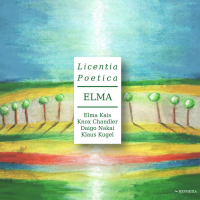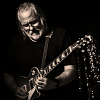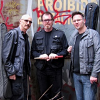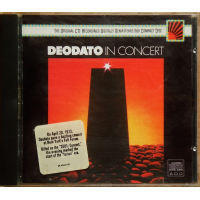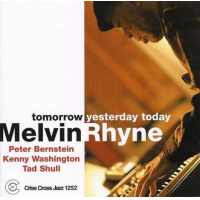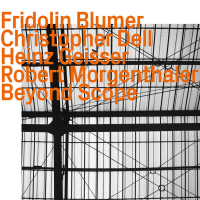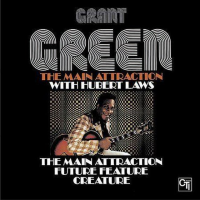Home » Jazz Articles » Liner Notes » Elma Kais: Licentia Poetica
Elma Kais: Licentia Poetica
More than 2000 years ago Ovid captured the essence of spontaneous improvisation in a stanza—as the collective of Elma Kais, Knox Chandler, Daigo Nakai and Klaus Kugel does on Licentia Poetica.
The Roman poet, author of "Metamorphoses," describes a creative outpouring which finds—or reveals—its perfect form as it flows from its source, regardless of or oblivious to plan. This album is a prime example: A suite by a unique ensemble comprising a stellar vocalist and unconventional electric guitarist (both also using electronics), an exploratory bassist and masterful drummer who as one address the pulse of time loosely, as open and atmospheric rather than a rigid frame. The result is as finely wrought as a string quartet or perhaps one of Ovid's elegiac couplets, although the music unfolds as it is created, in the moment, emanating from no prescriptions but its players' prior lives.
"Random or chaotic improvised music is not my cup of tea," maintains Elma Kais the multi-dimensional performer formerly known simply as ELMA by her newly refined stage name), whose previous albums Hic et nunc (2014) and Ad Rem (2016)—both in-studio productions with all-acoustic instruments were based, respectively, on pre-composed themes and a dreamscape described to players for their spontaneous responses. "It can be coherent, cohesive, narrative and emotionally expressive in a precise, clear and communicative way.
"You don't need words for that," she continues. "I like to think of and explore the human voice itself, as an instrument among others that creates non-semantic but still language-like vocalizations which broaden the spectrum of the narrative and emotional palette."
Pardon, then, my words—and let them serve confirm that Kais' syllabic fluidity, her propulsive rush of all manner of utterances which her colleagues feed and around which they swirl, informs a coherent, cohesive, story-like audio experience. Together the band evokes a breadth of responses, arising from the continuous twists they give to listeners' expectations or subjectively imagined plots. Taking full advantage of poetic license, Kais, Kugel, Chandler and Nakai conjure music that's both unpredictable and inevitable. Given what has led them to this stage, they could sound only like this.
Licentia Poetica is, in fact, a document of quartet's first concert. It happened August 30, 2020 at the Gdańskie Noce Jazsowe, yet is presented here with all the "live" trappings (announcements, crowd sounds, applause) removed, and the uninterrupted performance has been denoted as 13 distinct tracks, each titled for Ovid's Latin words, in the sequence of his quoted line. These aspects of presentation are intended to spotlight the players' collaboration as "pure music," distilled from its circumstances, to give the album's listeners more space for their own undisturbed, intimate reception. And indeed, in concept and realization it seems as consciously crafted as any studio production. So it's appropriate to note that the album embraces all the paradoxes attending such representations of unimpeded, free-of-format group engagements.
For instance: Each musician casts their own spell, yet the music's destiny is fulfilled only by their coming together. Also, their individual performances must (of course) expand upon what they've just done or what they've each perceived of what they've individually and collectively just done. What was played is always the field upon which what is played unfolds—it can be no other way and that in turn is the field for what will be played. Take these as characteristics of, not constraints on, the very idea of improvisation, for more of the improvisers' perspective.
Then there's the fact that upon the recording of instantaneous events—in real life here-and-gone as a fire flaring from a mix of unlikely elements—"immediacy" is fixed, and available for repeating listenings which will accrue distinct and different meanings for their auditors often regardless of the original context, based on what that auditor brings to the hearing. The "pure music" design of Licentia Poetica encourages, enables and may intensity this sphere of each listener's mental absorption and reaction.
Yet this music is born of primal urges, reactions humans universally share to sounds that are by turns inviting, incantatory, beguiling, mystifying, erotic, scary, funny, suppliant, explosive, airy, resolute, haunting and more. It is in no language but represents all language. Humans are relating to each other with and through intentional acts of sound projections, to make of them something more.
Note: Kais, Chandler, Nakai and Kugel have based their careers if not their lives on honing personal skills enabling them to conjure endless possibilities from their sounds. We understand them, although we may never have heard them or the sounds before. We comprehend this previously unmade music, because it's elements are fundamental and eternal although ineffable, always in the air.
"I very often play in an open context," says master drummer Kugel, "but I always play in time. This may be abstract time, but even that actually always has swing or groove. Additional gongs and sound object around my drum kit are used in time like the drums themselves. There is no separation between percussions' colors and its rhythms.
"Similarly, Elma's and Knox's use of electronics in this recording seem natural. I love the sounds. They contribute to an orchestral soundscape in which I intuitively play things I'd never do in a 'traditional' set-up like with reeds/bass and drums."
These players are all grounded, naturally, in traditions. Kugel has secured his reputation as an imaginative composer-percussionist through constant concertizing and more than 50 recordings with the international improvising elite since 1989. Kais studied classical music, including Gregorian chant in Christian liturgy, and excelled in vocal competitions while at the Krakow School for Jazz and Popular Music before earning her doctorate in psychological aspects of improvisation and establishing herself as a music therapist. Chandler, renown for his work with 1990s electronic, alt.-rock, post-punk and out-rock groups such as Depeche Mode and R.E.M., with membership in the Psychedelic Furs, Siouxsie and the Banshees and Cyndi Lauper's band and others, relocated to Berlin in 2012; he connected with Kugel when both were in saxophonist Mars Williams' Ayler Christmas project of 2018. Bassist Nakai, originally from Japan, emigrated to Australia where he joined ade ishs Trio (sic) before arriving in Berlin and securing his vital connective role in the Chandler-Nakai-Kugel Trio.
Elma was drawn to Klaus' recording with Polish clarinetist Waclaw Zimpel taking off from works by medieval composer Hildegard von Bingen. Her interest in early music extends to playing the hurdy-gurdy, an invention of the ninth century—although unconventionally, as on "Veniebat," pressing electronics to the strings rather than cranking its bow for especially dramatic ringing pitches. Her enthusiasms for the Chandler-Nakai-Kugel devotion to freedom of form, non-linear explorations and ability to explode with sudden intensity (as on "Quod") are embodied, too, by the visuals accompanying this album. Elma Kais cites Ola Lesnik, whose work adorns the albm, "an extremely gifted Polish teenager on the autism spectrum who does not speak but expresses herself and communicates with the world through her art" as "reinforcing our idea of telling stories, stirring the imagination and sharing feelings through a universal, deeply archetypal language that does not need to be literal or semantic to be understood, deeply moving and shared by audiences of diverse cultural backgrounds."
Is it possible to make music understandable to all, created in a single stretch of time, and seemingly different upon each encounter? As Greek philosopher Heraclitus averred (five centuries before Ovid), "No man steps in the same river twice—it's not the same river and he's not the same man." Consider Licentia Poetica a river to revisit. It seems different with each dive in both because you've changed and since the music in passing uncovers ever-changing facets, secrets of its dynamics and sonic dimensions.
Kais, Chandler, Nakai and Kugel plan to continue as an ensemble, to all our good. From this ensemble's combustive interplay comes something extraordinary: Music like poetry, that neither needs nor heeds license to flourish fully, as is.
Liner Notes copyright © 2026 Howard Mandel.
Licentia Poetica can be purchased here.
Contact Howard Mandel at All About Jazz.
Howard is a Chicago-born writer, editor, author, arts reporter for National Public Radio, consultant and videographer. Visit Howard at howardmandel.com.
Track Listing
Sponte; Sua; Carmen; Numeros; Vaniebat; Ad; Aptos; Et; Quod; Temptabam; Scribere; Versus; Erat.
Personnel
Album information
Title: Licentia Poetica | Year Released: 2022 | Record Label: Self Produced
Tags
PREVIOUS / NEXT
Support All About Jazz
 All About Jazz has been a pillar of jazz since 1995, championing it as an art form and, more importantly, supporting the musicians who make it. Our enduring commitment has made "AAJ" one of the most culturally important websites of its kind, read by hundreds of thousands of fans, musicians and industry figures every month.
All About Jazz has been a pillar of jazz since 1995, championing it as an art form and, more importantly, supporting the musicians who make it. Our enduring commitment has made "AAJ" one of the most culturally important websites of its kind, read by hundreds of thousands of fans, musicians and industry figures every month.

